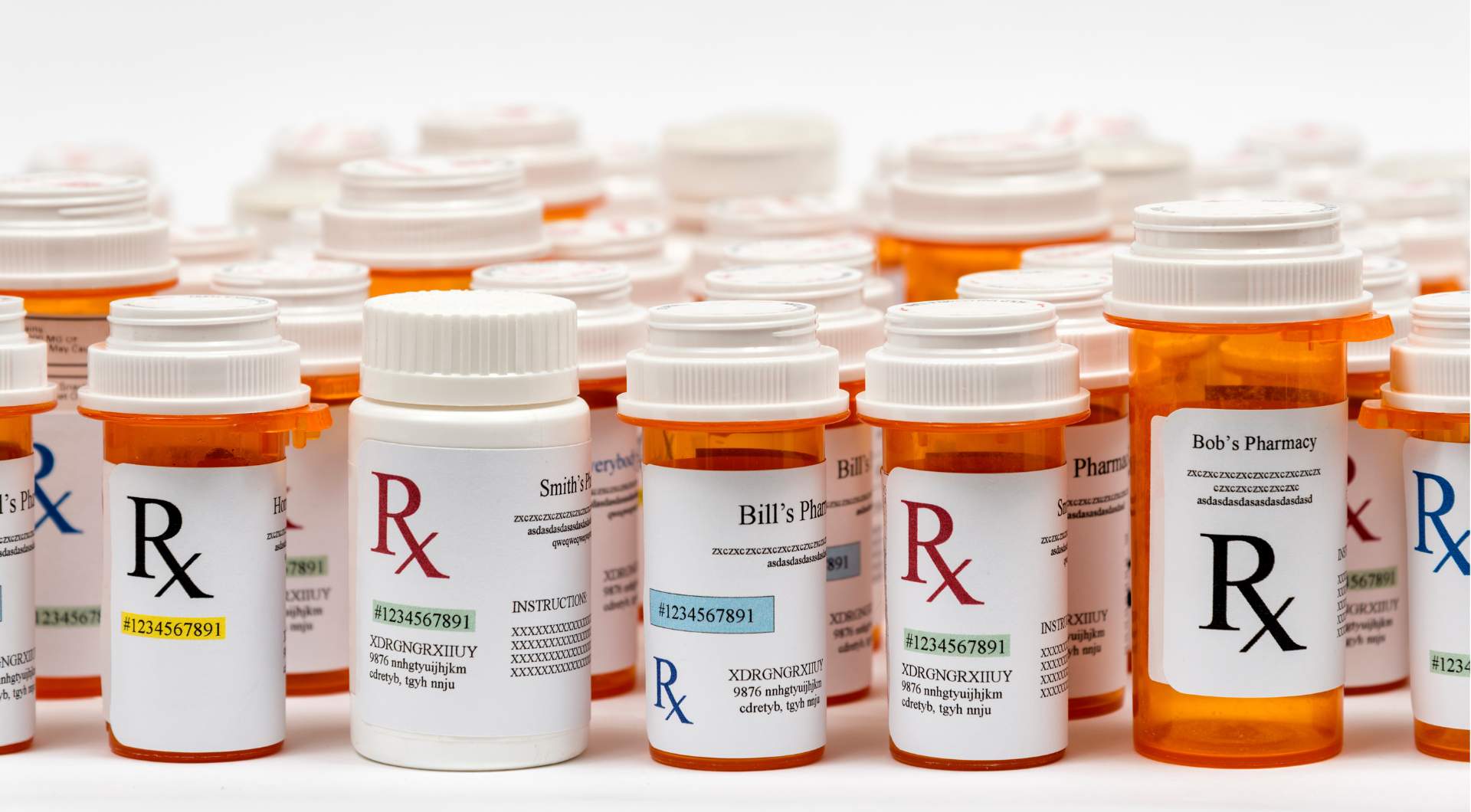The Dark Side of the Medicine Cabinet: The 3 Most Abused Prescription Drugs of 2025
August 28, 2025
Discover the latest prescription drug abuse statistics & facts for 2024. Unveiling trends, risks, prevention strategies, and future initiatives. Stay informed!
Doctors prescribe medications to promote healing, relieve pain, or manage symptoms. Misused, these drugs can cause significant harm.
Powerful medications designed to manage pain, calm anxiety, and treat attention disorders are being misused across the country. This silent epidemic often hides in plain sight, fueled by easy access, misconceptions about safety, and the dangerous belief that “if it’s from a doctor, it must be safe.”
In this article, we’ll uncover the three most abused prescription drugs and the signs of their abuse, answer some commonly asked questions about prescription drug abuse, and introduce you to Clear Steps Recovery and the help we provide.
Table of Contents
- What Is Prescription Drug Abuse?
- The 3 Most Abused Types of Prescription Drugs in 2025
- Commonly Asked Questions About the Most Abused Drugs in 2025
- Clear Steps Recovery: Compassionate, Individualized Treatment for Prescription Drug Abuse

Prescription drug abuse or misuse is taking a prescription drug in a way other than it was intended, which includes the following:
- Taking medication that was prescribed for another person
- Taking more medication than prescribed for one dose
- Taking the medication in a different way than it was intended (i.e., snorting or injecting pills that have been crushed up)
- Using medication for other purposes, like getting high
Prescription drug misuse is widespread across the United States, affecting people of all ages, from teens to the elderly. According to the National Center for Drug Abuse Statistics, six percent of Americans — or 16 million — over the age of 12 abuse prescription drugs in a year. Even though people experience unhealthy consequences, this type of drug abuse may become habitual and addictive.
If you are struggling to overcome a prescription drug addiction, the supportive team at Clear Steps Recovery is here to help. Our prescription drug rehab program provides treatment plans customized to each client’s needs and may include medication-assisted therapy, counseling, holistic therapies, and more.
To break the cycle of addiction and begin your journey to improved overall health, contact Clear Steps Recovery today.

#1: Opioids
Opioids are drugs that reduce pain by acting on the brain and spinal cord, also influencing emotions to lessen discomfort. While historically used for acute pain, cough, and diarrhea, and more recently for chronic pain, they can also trigger euphoria, making them prone to misuse and addiction.
In 2023, around 8.6 million Americans reported misusing prescription opioids. Not only is prescription opioid abuse a problem, but the risk of overdose is also a concern, especially because suppressed breathing can occur with overuse.
Prescription opioids that are commonly abused today include:
- Hydrocodone
- Oxycodone
- Oxymorphone
- Morphine
- Codeine
- Fentanyl
- Methadone
- Meperidine
- Propoxyphene
Signs of Opioid Abuse
If you or someone you love is misusing opioids, you or they may experience the following effects:
- Slowed breathing
- Drowsiness
- Confusion
- Constipation
- Nausea
- Euphoria
When opioids are mixed with alcohol or sedatives, suppressed breathing can lead to hypoxia, a condition that results when the brain doesn’t get enough oxygen. This condition can cause short- and long-term effects and can lead to coma, brain damage, or death.
Prescription opioid abuse can also lead to dependence on the drug and tolerance, which means the person needs more of the drug to feel the same effects.
Opioid addiction treatment is available at Clear Steps Recovery, where we combine health realization and family support to tailor a rehab program to each client’s needs.
#2: Central Nervous System (CNS) Depressants
Central Nervous System depressants work by increasing GABA signaling to slow brain activity, producing calming or drowsy effects. Commonly prescribed for anxiety, sleep disorders, and seizures, their sedative properties also make them highly susceptible to misuse.
CNS depressants are usually grouped into three categories and include the following medications:
- Barbiturates
- Phenobarbital
- Pentobarbital
- Secobarbital
- Mephobarbital
- Benzodiazepines
- Alprazolam
- Clonazepam
- Diazepam
- Sedating benzodiazepines
- Triazolam
- Estazolam
- Zolpidem
- Eszopiclone
- Zaleplon
Signs of CNS Abuse
Abusing CNS depressants can result in the following effects:
- Sleepiness
- Confusion
- Slowed breathing
- Slurred speech
- Poor concentration
- Dizziness
- Lowered blood pressure
- Respiratory distress
- Chronic fatigue
- Depression
- Suicidal thoughts
Combining CNS depressants with other medications or alcohol can cause serious reactions and may be fatal. Misuse of these types of drugs may also lead to dependence, tolerance, and addiction. Abruptly stopping the use of these medications can lead to withdrawal and have dangerous side effects, like seizures. If you want to stop your addiction, contact someone for help.

#3: Stimulants
Stimulants boost alertness, attention, and energy while raising blood pressure, heart rate, and respiration. Once used for conditions like asthma and obesity, they are now primarily prescribed for ADHD. Stimulants are also frequently misused for their energizing and focus-enhancing effects.
Common prescription stimulants include:
- Amphetamines
- Biphetamine
- Dexedrine
- Adderall
- Adderall XR
- Mydasis
- Methylphenidate
- Concerta
- Ritalin
- Daytrana
- Metadate
- Methylin
Signs of Stimulant Abuse
Stimulant prescription drug misuse can have severe consequences, including:
- Heart problems
- Seizures
- Panic attacks
- Paranoia
- Psychosis
- Violent behavior/hostility
- Elevated body temperature (hyperthermia)
Combining prescription stimulants with other medications, such as over-the-counter cold medicines, can increase dangerous side effects. Like other stimulants, including cocaine, these drugs carry a risk of dependence and addiction, and stopping their use may lead to withdrawal symptoms like fatigue, depression, and sleep disturbances.

Why Is Fentanyl Considered To Be Especially Dangerous?
Fentanyl is a synthetic opioid up to 50 times stronger than heroin and 100 times stronger than morphine. Because of its extreme potency, it is often mixed — sometimes without the user’s knowledge — into drugs like heroin, cocaine, methamphetamine, or counterfeit pills. This makes them cheaper, more addictive, and far more dangerous. Even tiny amounts can greatly increase the risk of overdose and death.
How Did the Opioid Epidemic Evolve In 2025?
The opioid crisis has moved from prescription painkillers to powerful synthetic opioids like fentanyl, with many overdoses now involving fentanyl mixed with other drugs. These developments make prevention and treatment efforts challenging.
According to the CDC, the evolution of the opioid epidemic has occurred in three “waves”:
- Wave One (1990s) – Deaths due to overdoses of prescription opioids
- Wave Two (2010-2013) – Spike in heroin-involved deaths
- Wave Three (2013-present) – Rise in deaths from synthetic opioids — like fentanyl and tramadol)
What Should I Do if I Can't Stop Abusing Prescription Drugs?
Reach out for help!
Quitting an addiction to prescription drugs can be very difficult — if not impossible — to do on your own. Getting help from family, friends, and professionals at an addiction rehab center is often the most important step in drug addiction recovery.
Most recovery centers offer treatment plans that include a combination of some of the following:
- Medical assessment
- Detox and withdrawal support
- Medication-assisted therapy
- Counseling
- Cognitive-behavioral therapy
- Family therapy
- Aftercare
- And more
If you’re ready to step into a new life free from dependence and addiction to prescription drugs, contact a recovery center near you.

If you live in New Hampshire or Massachusetts and want help with a prescription drug abuse addiction, Clear Steps Recovery is ready and poised to help. We approach each client individually and design a treatment plan specifically to meet each person’s unique needs.
Our treatment plans may include:
- Comprehensive medical assessments
- Medication-assisted therapy
- Counseling
- Holistic/alternative therapies
- And more
Contact Clear Steps Recovery today to end the addiction cycle, live a life of sobriety, and experience these benefits of treatment:
- Improved health
- Improved clarity
- Increased focus
- Improved relationships
Our skilled behavioral health team is dedicated to delivering exceptional care in a compassionate, supportive setting. In our outpatient program, we combine evidence-based therapies with holistic methods to help clients manage addiction and take meaningful steps toward lasting recovery.

The content in this blog is not intended to be a substitute for professional medical advice, diagnosis, or treatment. Always seek the advice of your physician or other qualified health provider with any questions you may have regarding a medical condition.
Learn About Clear Steps Recovery and How We Can Help You
Once you reach out to Clear Steps Recovery, your path becomes clear, and you can get the help and support you need to break the cycle of addiction. Our serene woodland environment promotes physical, mental, emotional, and spiritual healing.
Call today or contact us online to get started.
The Path Is Clear – Take Your First Steps Today with Clear Steps Recovery
With our team and your desire to heal, we can improve your quality of life and functional abilities, so you can get back to living your best life.
































.jpg)


















.jpg)
.jpg)















































